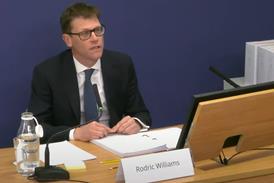The Court of Appeal has handed victory to a defendant arguing for indemnity costs after being unsuccessfully sued by her former neighbours.
Lord Justice Coulson said the couple in Lejonvarn v Burgess & Anor had brought speculative and weak claims, and had unreasonably refused to accept a Part 36 offer made within weeks of proceedings starting.
The case examined the issue of defendants not being automatically entitled to indemnity costs if they have beaten their own Part 36 offer. It also raised questions about whether cases which go to trial could be deemed any less weak than those dropped before reaching court.
In the underlying case, the Burgesses had sued the appellant Basia Lejonvarn, an architect, after she provided free help to them on major landscaping work in their garden. The claim failed in its entirety after the court held that Lejonvarn had in fact provided very few services and had not been negligent (even if she owed them a duty of care). Despite losing in the Court of Appeal, the couple then brought a new case described as ‘diametrically opposed’ to their original one. They failed again when the new case went to trial.
Lord Justice Coulson conceded that Lejonvarn’s final £724,265 costs bill was ‘eye-watering’, particularly compared with her approved costs budget of £415,000. The High Court had ruled the costs should be assessed on the standard basis, but Lejonvarn now sought assessment on an indemnity basis before the Court of Appeal.
Lord Justice Coulson said the judge in the High Court had seemed to disallow indemnity costs on the basis that the second claim went to trial and was therefore not speculative.
‘[The judge] appeared to consider that an order for indemnity costs was only appropriate where it could be shown with hindsight that costs had been unnecessarily incurred,’ said Coulson. ‘I do not accept that this was the right approach as a matter of principle.’
He said that having had time to consider the implications of their failed claim, the respondents should have realised the remaining claims were so weak that they were very likely to fail.
Coulson also noted that the decision to continue the case was less about seeking fair and reasonable compensation and more about punishing Lejonvarn for alleged mistakes.
The appeal court then addressed the issue of Lejonvarn having beaten her own Part 36 offer. The architect had offered at the outset of proceedings in 2015 to settle for £25,000. Coulson said she had acted ‘sensibly and proportionately’, in contrast to the respondents who had rejected the offer.
Coulson said the court should always consider whether the claimant’s conduct should make a defendant eligible for indemnity costs, even if he baulked at the notion that defendants should be automatically entitled to indemnity costs in the same way as claimants.
But he declined to award indemnity costs dating back to when the offer was made and instead set them from a month after the first Court of Appeal judgment which should have seen an end to proceedings. At this point it was ‘unreasonable beyond any doubt’ that the couple did not accept a Part 36 offer to settle.

















![David Lester (senior partner at Blythe Liggins), Darryl Barnes, Jagdeep Sandher (head of dispute resolution at Blythe Liggins)[4]](https://d1d8vslyhr7rdg.cloudfront.net/Pictures/274x183/4/2/8/116428_davidlesterseniorpartneratblytheligginsdarrylbarnesjagdeepsandherheadofdisputeresolutionatblytheliggins4_981603_crop.jpg)






5 Readers' comments